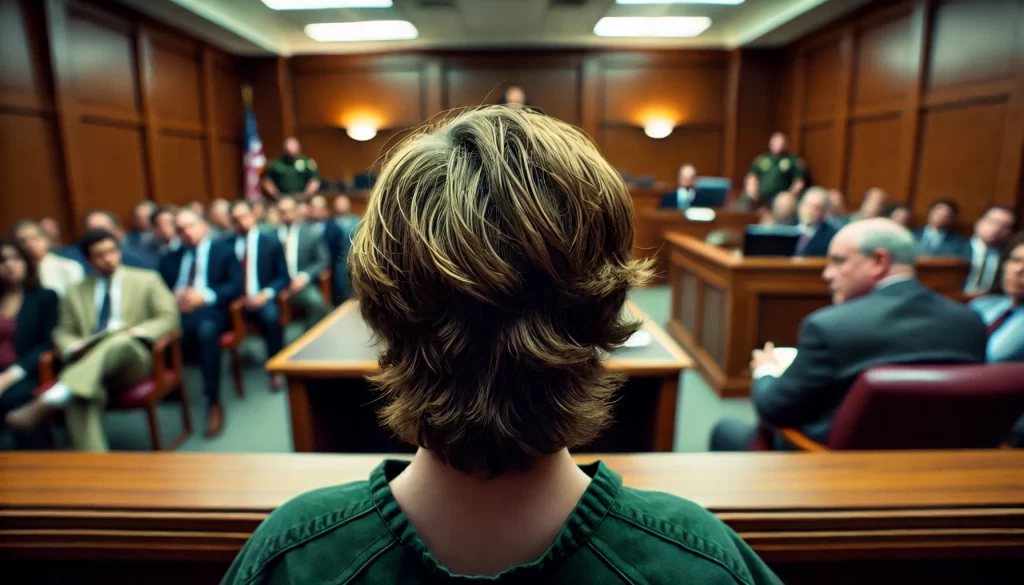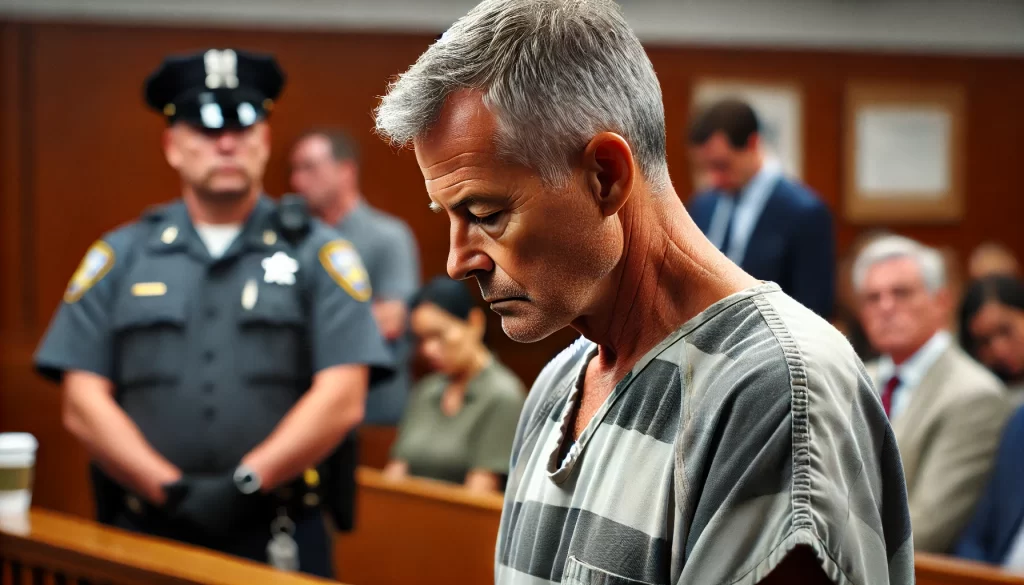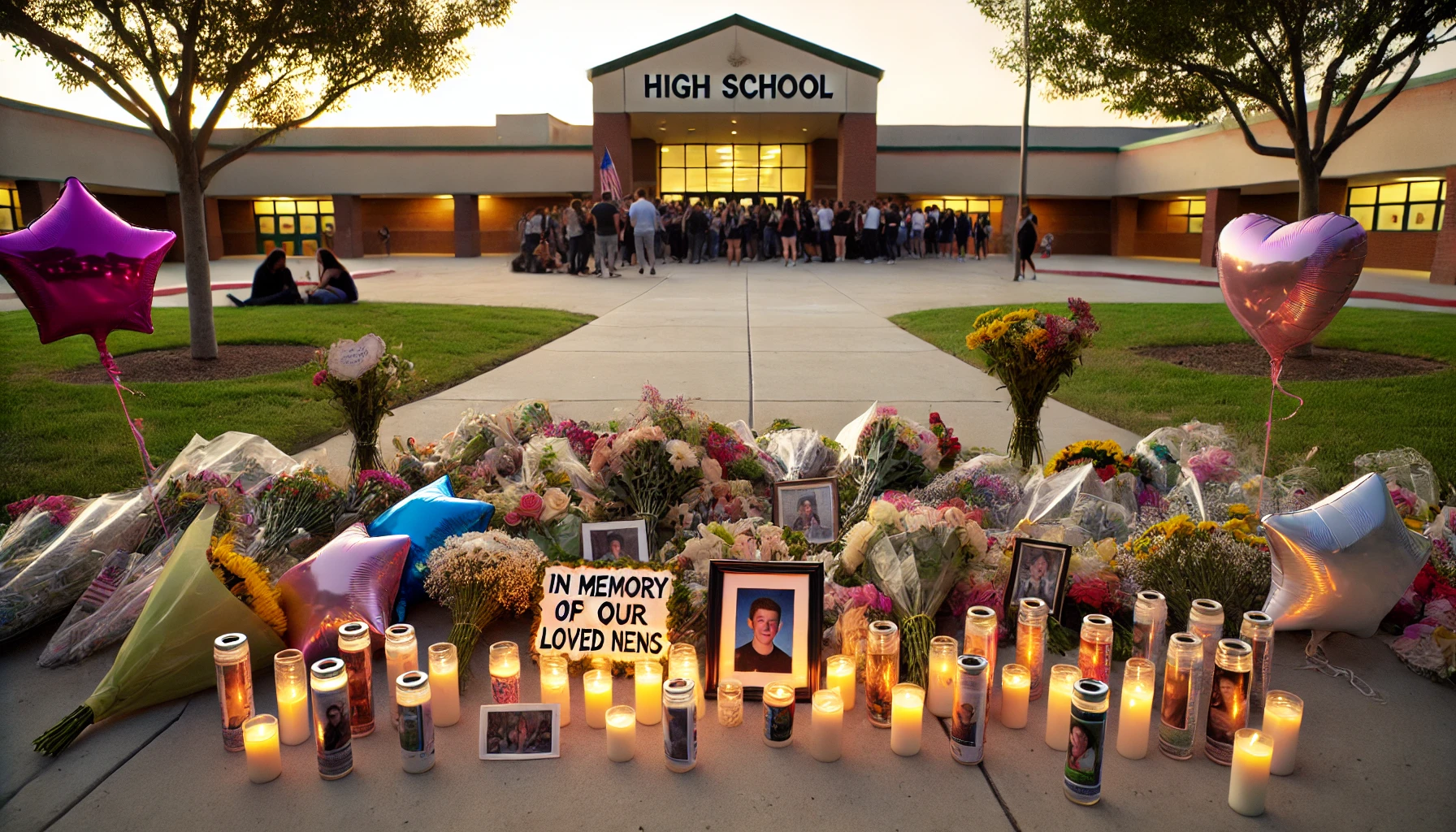A devastating school shooting occurred on the morning of September 4, 2024, at Apalachee High School in Winder, Georgia, resulting in the deaths of two students and two teachers, and injuries to nine others. The suspect, 14-year-old student Colt Gray, has been arrested and charged with four counts of felony murder. This tragedy marks the deadliest school shooting in Georgia’s history and has shocked the local community.
The Events of the Shooting
The shooting began around 10:20 a.m. when students and staff heard gunfire erupt in the hallways of Apalachee High School. Colt Gray, armed with an AR-15-style rifle, left his Algebra 1 class shortly before the shooting started. He attempted to re-enter the classroom, but one of his classmates, recognizing the gun, refused to open the door. The refusal possibly prevented further casualties in that classroom. Gray then turned to another nearby classroom, where he fired between 10 and 15 shots.
Students immediately took cover. Some hid in closets, while others used rags to help their wounded teacher. One student, Sophie, described how her teacher had gone into the hallway to investigate a noise when he was shot. The scene was described as chaotic, with blood on the floor and students desperately trying to help their teacher before paramedics arrived.
Within minutes of the initial shots, school resource officers confronted Gray. The suspect surrendered without further resistance and was taken into custody. The school was placed on lockdown, and law enforcement quickly secured the building.
The Victims
The victims of the shooting were identified as 14-year-old students Mason Schermerhorn and Christian Angulo, and teachers Richard Aspinwall, 39, and Cristina Irimie, 53.
- Mason Schermerhorn was described by friends as a lighthearted teenager who enjoyed reading and playing video games. His loss has left a deep void in his family and school community.
- Christian Angulo was remembered by his older sister Lisette as a “very good kid” who was “sweet and caring.” His family is devastated by his untimely death.
- Cristina Irimie, originally from Romania, had been a math teacher at Apalachee High School for many years. Friends and family members remember her as a dedicated teacher who deeply cared for her students. She was also active in her local Romanian community and her church.
- Richard Aspinwall, also a math teacher and the school’s football defensive coordinator, was beloved by his students and players. Known affectionately as “Coach A,” he was a supportive mentor to many young athletes and leaves behind two young daughters.
In addition to the four deaths, nine other people were injured in the shooting, including eight students and one teacher. Authorities have stated that all of the injured victims are expected to survive.

The Shooter’s Background
Colt Gray, the suspect in the shooting, was a 14-year-old student at Apalachee High School. He has been charged with four counts of felony murder and is expected to be tried as an adult, despite his young age.
Authorities revealed that Gray had previously been investigated in 2023 when he was 13 years old. The FBI and local law enforcement interviewed him and his father after receiving an anonymous tip regarding an online threat to “shoot up a middle school.” The tip came from the chat platform Discord, where messages linked to Gray’s email had been posted. At the time, investigators found no evidence to justify an arrest and did not take further action.
Gray’s troubled background includes a history of family instability. His parents had separated, and his maternal grandfather, Charlie Polhamus, mentioned that Colt had been deeply affected by his home environment. Polhamus partially blamed Colt’s father for the environment Colt was raised in.
The Father’s Involvement
The shooting has also led to the arrest of Colt’s father, Colin Gray, aged 54. Colin Gray has been charged with four counts of involuntary manslaughter, two counts of second-degree murder, and eight counts of cruelty to children. The charges stem from his role in allowing Colt to access the AR-15-style rifle used in the shooting. Authorities revealed that the weapon had been a Christmas gift from Colin to his son in December 2023, just months after the FBI had warned the family about potential threats.
During the FBI investigation in 2023, Colin Gray told officials that he kept hunting rifles in the house but assured them that his son did not have unsupervised access to the weapons. He stated that he would be “mad as hell” if his son had made any threats about a school shooting, but took no further action to secure the weapons.
The case of Colin Gray is notable because prosecutions of parents in connection with shootings committed by their children are rare. However, it is not unprecedented. Earlier in 2024, parents in Michigan were convicted of involuntary manslaughter for their roles in their teenage son’s shooting at a high school.

Investigations and Political Response
As the investigation continues, law enforcement has been unable to determine the motive behind the shooting or how Colt obtained the weapon and brought it into the school. Authorities are still piecing together the exact timeline of events leading up to the tragedy.
The shooting has reignited debates over gun control and school safety. At a press conference, Georgia Governor Brian Kemp called the shooting “everybody’s worst nightmare.” He expressed heartbreak over the tragedy and called for Georgians to hug their children a little tighter in the wake of the incident.
Other political leaders also weighed in. At a campaign stop, Democratic presidential nominee Kamala Harris called the shooting a “senseless tragedy” and emphasized the need to end the epidemic of gun violence in America. Former President Donald Trump expressed sympathy for the victims, calling the shooter a “sick and deranged monster.”
Community in Mourning
The town of Winder, Georgia, has been left reeling from the tragedy. Hundreds of people gathered at Jug Tavern Park for a vigil in memory of the victims. As the community processes the horrific events, schools in the area have been closed for the remainder of the week, and the Apalachee High School football game scheduled for Friday has been canceled.
Some students have expressed fears about returning to school. Macey Right, a 14-year-old student, described how the incident has shaken her sense of safety. “I want to go to school worrying about my GPA, not about dying,” she said.
This article is based on the following articles:
https://www.cnn.com/2024/09/05/us/winder-georgia-shooting-apalachee-high-school/index.html
https://www.nytimes.com/2024/09/06/us/apalachee-high-school-georgia-shooting.html

Background Information
1. School Shootings in the U.S.
A school shooting happens when a person brings a gun to school and opens fire, often resulting in injuries or deaths. Sadly, school shootings have become more common in the United States over the past two decades. These incidents bring up concerns about student safety, mental health, and gun control.
The first widely known school shooting in the U.S. happened at Columbine High School in Colorado in 1999. Since then, there have been multiple school shootings across the country, including at Sandy Hook Elementary in 2012 and Marjory Stoneman Douglas High School in 2018. Each of these tragedies has reignited debates over how to keep students safe while they are in school.
Many schools have taken safety measures such as installing metal detectors, hiring school resource officers (police officers who work at schools), and conducting lockdown drills to prepare students and staff for the possibility of a shooter on campus. However, these steps haven’t always been enough to prevent violence.
2. Gun Control and Gun Laws
Gun control refers to the laws and policies that regulate who can buy, own, or use guns. In the U.S., gun laws vary from state to state. Some states have stricter rules about purchasing and owning firearms, while others are more lenient.
A key issue in the gun control debate is the type of firearms that should be allowed for civilians to own. While many people argue that guns are necessary for self-defense or hunting, others believe that certain guns—especially high-powered rifles like the AR-15—are too dangerous to be widely available.
Many people in the U.S. believe that stricter gun control laws could prevent mass shootings. They argue that background checks, waiting periods, and restrictions on owning certain types of guns could make it harder for people who are likely to commit crimes to get firearms. On the other hand, some people believe that owning guns is a fundamental right and that it helps protect individuals from danger.
3. The AR-15 Rifle
The AR-15 is a popular type of semi-automatic rifle, meaning that the shooter can fire one bullet each time they pull the trigger, without having to reload after each shot. The AR-15 is a civilian version of a military rifle called the M16, which was designed for combat.
AR-15s have been used in several high-profile mass shootings, including the ones at Sandy Hook Elementary and Parkland, Florida. Because of this, many people associate the AR-15 with gun violence, especially when it comes to school shootings.
While the AR-15 is legal to own in many parts of the U.S., its use in mass shootings has led to calls for banning or regulating the sale of these types of guns. People who support such a ban argue that the AR-15 is too powerful and dangerous for civilian use.
4. Parents’ Responsibility in School Shootings
In recent years, there has been increasing attention on the role of parents in school shootings, especially when the shooter is a minor. In some cases, parents are prosecuted for allowing their children access to guns or for not taking action when they knew their child might be dangerous.
For example, after the 2021 shooting at Oxford High School in Michigan, the parents of the shooter were charged with involuntary manslaughter. This was the first time in the U.S. that parents were held criminally responsible for a school shooting committed by their child.
Many people argue that parents should be more cautious about how they store their firearms, especially when they have children at home. Some states have laws requiring parents to lock up their guns so that children cannot access them without supervision.
5. Mental Health and Warning Signs
Mental health plays a major role in preventing school shootings. In many cases, the shooters have shown signs of emotional distress, anger, or depression before committing the crime. Some have made threats online or told others about their plans to carry out a shooting.
Because of this, mental health professionals, teachers, and parents are encouraged to pay attention to warning signs that a child might be struggling. These signs can include extreme anger, isolation from friends and family, or making threats of violence. When these signs appear, getting help from a mental health professional can sometimes prevent a tragedy.
In some cases, law enforcement officials have been alerted to warning signs but have not taken action. This happened with the Parkland shooter in 2018, and it appears to have been a factor in the Apalachee High School shooting as well. In both instances, the shooters had made threats online, but law enforcement didn’t find enough evidence to make an arrest before the shootings occurred.
6. Juvenile Justice System
In the U.S., most people under the age of 18 who are accused of crimes are tried in the juvenile justice system, which is separate from the adult criminal justice system. The goal of the juvenile justice system is often to rehabilitate young offenders rather than punish them harshly.
However, in cases where juveniles commit very serious crimes—like murder—they can be tried as adults. This is the case for Colt Gray, the suspect in the Apalachee High School shooting. Trying juveniles as adults can result in much harsher sentences, including life in prison.
Deciding whether to try a juvenile as an adult depends on many factors, including the seriousness of the crime, the age of the offender, and whether the crime was planned or committed impulsively. There is ongoing debate about whether trying young people as adults is fair or effective.
7. Impact on Schools and Students
School shootings have a lasting effect on the students, teachers, and families involved. Survivors of school shootings often experience trauma and may need counseling or therapy to recover from the event. Students who witness or are injured in such attacks may struggle with anxiety, depression, or fear of returning to school.
In the aftermath of a school shooting, schools often close for several days to allow the community to grieve and recover. Counselors are usually available to help students process their emotions. Schools also review their safety protocols, such as installing more security cameras or increasing the number of school resource officers, to prevent future incidents.
These tragic events leave long-term scars on the community and often lead to discussions about how to better protect students and prevent violence in schools.

Debate/Essay Questions
- Should the sale of AR-15-style rifles to civilians be banned in the United States?
- Should parents be held legally responsible if their child uses a gun to commit a crime?
- Do schools in the U.S. need more security measures to prevent shootings, or should the focus be on mental health and early intervention?
- Should the U.S. adopt stricter gun control laws to reduce the number of school shootings?
Please subscribe to Insight Fortnight, our biweekly newsletter!
